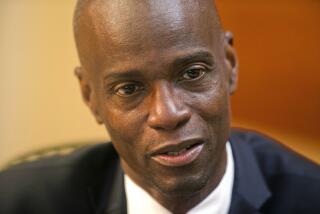El Salvador to Reopen Murder Probe
- Share via
SAN SALVADOR — Under pressure from domestic and international courts, Atty. Gen. Belisario Artiga announced Wednesday that he will investigate a former president and other public officials to determine whether they ordered the 1989 murders of six Jesuit priests, their housekeeper and her daughter.
“We are asking [the court] for permission to investigate as masterminds former President Alfredo Cristiani and high-ranking military officers in the murder of the Jesuit priests,” Artiga told reporters. He indicated that he expected to receive permission to proceed.
Besides Cristiani, he identified Col. Rene Emilio Ponce, a former defense minister; Gen. Rolando Zepeda, former vice minister of defense; Col. Orlando Montano, also a former vice minister of defense; Col. Francisco Helena Fuentes, former chief of the 1st Infantry Brigade; Col. Humberto Larios, a former defense minister; and Gen. Rafael Bustillo, a former air force commander.
The priests, all professors at the University of Central America here, were slain Nov. 16, 1989, in the midst of an offensive on the capital by leftist Marxist guerrillas.
The official investigation did not touch anyone above the rank of colonel. Two officers and four soldiers were convicted and served time in prison until released under a 1993 amnesty.
The Jesuit order and the university have insisted that the investigation did not go far enough to determine who ordered the killings. A United Nations truth commission report issued in 1992 found that Cristiani and the military officers met together shortly before the killings.
Jesuits took their case to the San Jose, Costa Rica-based Inter-American Human Rights Court, which found in late 1999 that the Salvadoran government should reopen the investigation. At that time, Artiga refused, arguing that the statute of limitations had recently expired.
However, university Rector Jose Maria Tojeira said that because Salvadoran public officials have immunity from prosecution while in office, the statute of limitations does not begin to run until their terms end.
Artiga changed his mind after two courts decided in unrelated cases that a judge, and not the attorney general, should decide whether there is sufficient evidence to warrant an investigation.
“We believe that it is good that the law works,” Tojeira said. “The attorney general is following proper procedure and investigating. Whether he will do it well or do it poorly, I don’t know.”
Wednesday’s announcement comes at a time when survivors of the victims of crimes committed by the military during the 12-year civil war are seeking other means to win the justice they believe they have been denied.
Officials in charge of the Salvadoran army in 1980, when soldiers killed three nuns and a lay worker near the start of the civil war, are currently defendants in a Florida civil suit brought by the women’s relatives.
The Jesuits have been looking into the possibility of filing suit in Spain because five of the slain priests were Spaniards. Those efforts will be postponed as long as an investigation proceeds in El Salvador, Tojeira said.
More to Read
Sign up for Essential California
The most important California stories and recommendations in your inbox every morning.
You may occasionally receive promotional content from the Los Angeles Times.













